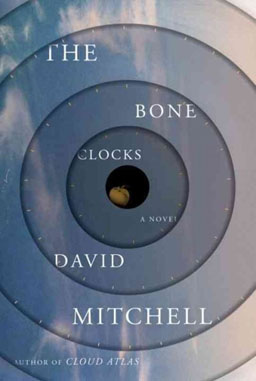This post about The Bone Clocks contains mild spoilers.
When grappling with works of genre fiction, most mainstream literary critics can be counted on to demonstrate a peculiar tone-deafness. Take the case of The New Yorker's James Woods, who calls David Mitchell's new novel The Bone Clocks "weightless," "empty," and "demented." So "frictionless" does Wood find it, in fact, that it prompts him to call into question the soundness of such earlier Mitchell works as Cloud Atlas.
Upon reflection, I have to admit that The Bone Clocks is probably my least favorite of Mitchell's novels (The Thousand Autumns of Jacob de Zoet being the only one I haven't yet read). But I found it for the most part extremely engaging, even thrilling, and I dispute Wood's contention that "the realism—the human activity—is relatively unimportant" when stacked up against the novel's science-fictional premise.
The Bone Clocks is built, like much of Mitchell's work, around a structural conceit that passes the duty of first-person narrator, like a baton in a relay race, to a new point-of-view character every hundred pages or so. Each of the book's six sections becomes, in essence, a novella of its own, conveying the overall narrative from its intensely realistic beginnings with a runaway teenager in 1984 to its apocalyptic, post-oil conclusion in 2043.Each subsequent section shows us earlier characters through new, illuminating sets of eyes, while in the background we get glimpses of a long-running secret war between two groups of more-or-less-immortal combatants. The fifth section immerses us fully in this ancient conflict before the sixth returns us to the point of view of our original narrator, Holly Sykes, though 59 years have passed since we first met her.
Critic Wood finds the novel entertaining enough, and skillfully written, though he complains that the supernatural shenanigans rob our lowly mortal heroes of their agency. The story turns these sad "detectives of drivel" into mere puppets marched here and there at the whims of their scheming author-god.
It's true that some of the genre material clunks and clangs, most particularly the fifth section's climactic battle between the good Horologists and the evil Anchorites. (I found it perversely reassuring to see that Mitchell doesn't do everything well.) But this does nothing to rob any of the mortal characters of their agency. Far from being puppets, they continue to love, hate, yearn, rage, seek vengeance, and forgive, just like real people, even as they struggle to resist the larger conflict that periodically disrupts their lives in ugly ways. Yes, sometimes the irresistible forces of the novel alter the trajectories of ordinary lives, but no differently than might a traffic accident, or a job loss, or a chronic illness. A narrowing of options does not imply a loss of agency.
Wood insists that the larger-than-life conflict drains the rest of the story of meaning, that what happens "in the novel between people has meaning only in relation to what occurs in the novel between Anchorites and Horologists." I disagree. Mitchell has plenty to say in this book. It's just that critics of Wood's ilk miss it because it's rendered in a register they can't hear (the register of ideas), not the one they're listening for (the register of the human heart). (The irony is, The Bone Clocks is filled to the brim with matters of the human heart.)
So what is Mitchell up to in The Bone Clocks? The key, for me, is in that strange sixth section, depicting the days when our teetering civilization finally teeters too far and slides irrevocably toward collapse. This is when we realize that the battle between Horologists and Anchorites, like all mankind's internecine battles, is what is truly insignificant. Holly's lifelong struggle to ignore the battle waging around her, to carry on with her life despite everything, is the entire point. It mirrors humanity's own struggle to carry on while helpless to oppose the gargantuan forces dismantling our ecosystem and our very society. How often do we raise our heads above the parapet, survey that epic destruction, then do our best to pretend it isn't ever really going to affect us?
It's a bleak view, yes, but one not devoid of hope. The last few pages of the book remind us that, even if our own generation is doomed, the fight is still worthwhile—perhaps only worthwhile—if there's a chance of saving the next.
James Wood closes his analysis by implying that humanity since Milton has had no need of the good-versus-evil story. "The novel takes over from the epic," he says, "not just because inwardness opens itself up as the great novelistic subject but because human freedom asserts itself against divine arrangement." But from where I'm sitting, as feckless, sluggish governments battle titanic, rapacious corporations with the fate of our species and countless others in the balance, human freedom seems as illusory as ever, and an epic like The Bone Clocks every bit as necessary.


